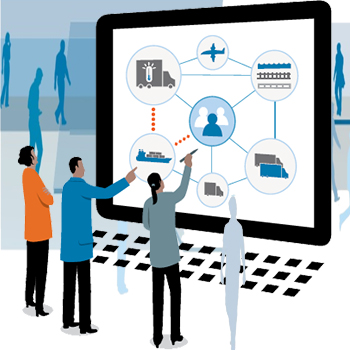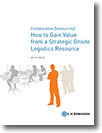Outsourcing is a big decision, but myths about outsourcing can cloud your decision-making.
Companies may decide whether or not to outsource based on factors that may not reflect market realities.
If outsourcing is undertaken for the wrong reasons, dissatisfaction with the overall outsourcing engagement can result.
Such an outcome can be mitigated by examining some ideas that have taken hold concerning logistics outsourcing:
- We can hand over the problems and issues associated with logistics operations by outsourcing
Don’t expect to outsource, wash your hands of logistics, and ride off into the sunset. You and your staff know your business, your customers, and what you want to achieve. The provider needs that input to solve logistics challenges that confront your company. Communication and collaboration with your outsourced logistics provider helps them understand your business and logistics goals. It also builds a high level of trust and ensures that the outsource solution aligns with your supply chain strategy. Without this, you’re more likely to experience frustration, blame, and poor logistics performance. - Our costs will increase if we outsource logistics
That’s not what happened for companies surveyed for the “2014 Third Party Logistics Study: The State of Logistics Outsourcing.” Those companies reported that outsourcing reduced logistics costs by an average of 11%, inventory costs by 6%, and logistics fixed assets by 23%.[1] While your savings may vary, you can determine what it costs you now to staff and maintain your supply chain operation, and weigh those costs against the potential benefits of outsourcing. - Overall service levels will fall and customer complaints will increase if we outsource
Preventing complaints and maintaining a high level of customer service should be everyone’s top priority - including your outsource provider’s, since they are an extension of your team. Organizations that collaborate with their outsourcing provider often benefit from the wealth of best practices that the provider brings from other outsourcing engagements. Many companies see improvements in customer service after they outsource. In fact, you are more likely to experience falling service levels and complaints if you leave the provider on their own. - We will lose the connection between our brand and the customer’s experience by outsourcing
Imagine that your company sees final mile delivery as a core competency. By the time you outsource, your provider should believe as strongly as you do that there is a direct connection between final mile delivery, the customer’s experience, and, ultimately, the reputation of your brand. An outsource provider that does the job right will always seek to elevate customer experiences, not erode them. - We will lose control of the strategy
With a well-structured outsourcing arrangement, you can actually increase control. You can require the provider to bring in strong talent to focus on tactical operations while your staff concentrates on strategic issues. Have them participate in daily, weekly, and monthly reviews. Require that they own, implement, and maintain best in class TMS technology that you can use for your operations. Even have them gather reports and provide analysis for metrics you and your company care about.
[1] Langley, C. John Jr., Ph.D., and Capgemini. “2014 Third-Party Logistics Study: The State of Logistics Outsourcing.”
As competition heats up, more companies are likely to engage in collaborative relationships with proven global supply chain outsourcing providers.
Such providers can add expertise and visibility and act as an extension of the company’s logistics team. In this way, companies can reach higher levels of logistics capability and leverage their provider’s scale in ways that can lead to a competitive advantage.
White Paper Resources on Outsourcing Logistics
Is Logistics Outsourcing Right for Your Company?
This white paper can help companies decide, set reasonable expectations for what outsourcing can contribute to the organization, and how much of a role the company will need to play to achieve the successful business outcomes they seek.
Create a Culture of Change
This 3-part white paper series looks at how companies can prepare for a logistics outsource. Discover how to build a change management framework, what needs to happen before and during implementation, and how to sustain a culture of continuous change.
How to Gain Value from a Strategic Onsite Logistics Resource
Logistics outsourcing agreements can require the provider to place highly knowledgeable, strategic staff onsite at the company’s location. This paper looks at the strategic onsite role and includes best practices with onsite resources that can increase successful outcomes.
Gaining Efficiencies Through LTL Outsourcing
Improve efficiency and lower costs by outsourcing less than truckload (LTL) freight. Read this paper to learn why companies outsource LTL, how LTL pricing and discounts actually work, and what to look for in an LTL outsourcing provider.
Article topics
Email Sign Up






















